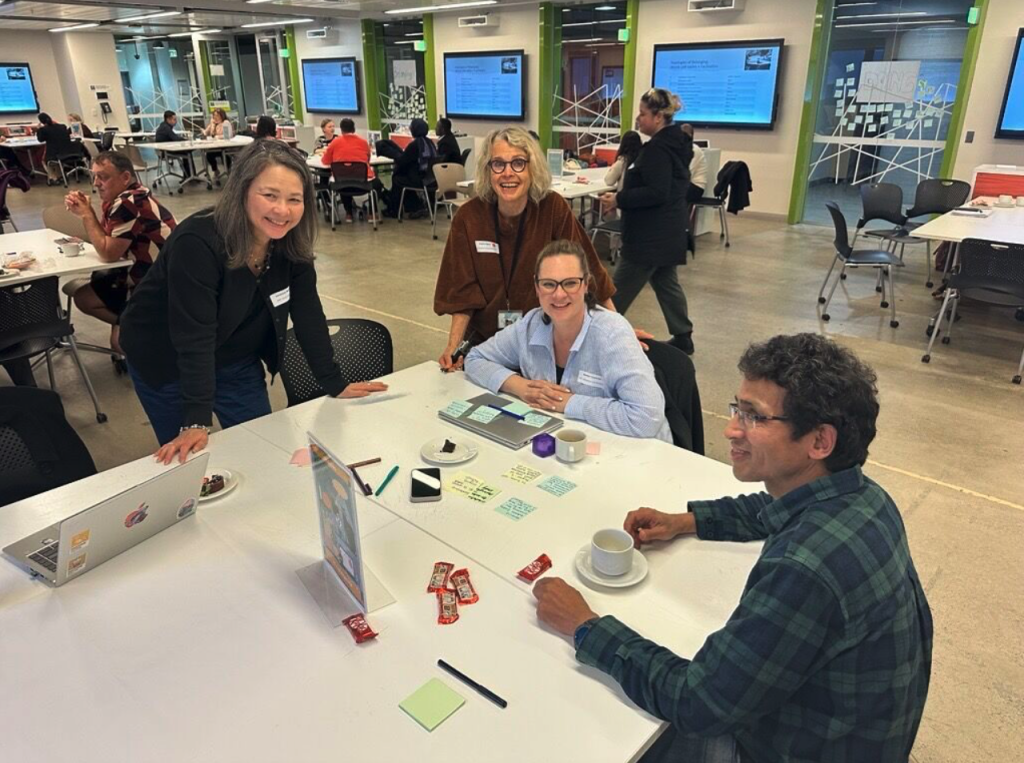At the end of a busy Autumn semester, when time can be hard to find, it is important to engage in meaningful meetings and interactions that will recharge us for the next semester. The First and Further Year (FFYE) Forum was just that. It was a chance to connect with colleagues from other faculties and engage in conversation about the changing landscape of belonging in higher education.
The Doing, being, becoming and belonging – spaces and practices event was my first experience of an on-campus FFYE Forum. I have recently joined UTS as the Academic Director of First Year within the Faculty of Science and serve as the Science FFYE Transition Coordinator, so the forum theme was of great interest to me. Also, as someone who is motivated by food and afternoon tea, it was fabulous to see such a great spread to help stimulate conversation and connection.
The day began with an ice-breaker facilitated by the TD School’s Beate Mueller and Hiba Rehman from FEIT, followed by a presentation by Lisa-Angelique Lim from CIC (Connected Intelligence Centre).
Insights from Lisa-Angelique Lim
How do university students experience belonging and how does that experience evolve over time? Lisa-Angelique Lim’s research dives deep into this question, to uncover the lived experiences of students across their academic journey.
Her findings reveal that the sense of belonging is not static. It fluctuates significantly, even within the first year of study, and tends to decline by the third year. Lim identifies 3 distinct levels at which students experience belonging:
- Institutional Level – Feeling part of the university community as a whole
- Discipline Level – Connecting with peers and faculty within their chosen field of study
- Subject Level – Engagement and inclusion within individual classes
This sheds light on the complex ways students connect with their university experience. It emphasizes the need to facilitate a sense of belonging across different areas to enhance their wellbeing and academic success.
Topologies of Belonging
You might be wondering, “Topologies of Belonging – what does that even mean, and why should I care?” It’s easy to feel like this is just another piece of academic jargon to memorize. But here’s the thing: belonging isn’t a fixed idea or a checklist item – it’s a living, shifting experience. It’s shaped by the spaces we move through, the people we connect with and the evolving ways we learn and engage. So, when we talk about “topologies of belonging” we’re really talking about the many forms and pathways through which students feel connected (or disconnected) in their university journey.
Belonging is not a fixed entity but instead needs to be considered in relation to the material, the temporal and the spatial. Gravett, K., Ajjawi, R., & O Shea, S. (2023) Topologies of belonging in the digital university
In 2023, Dr. Karen Gravett and her colleagues published their work on Topologies of Belonging in the Digital University. Their research explores how belonging is shaped within digital and hybrid learning environments. Building on this work, the team received funding from the Economic and Social Research Council (ESRC) Impact Award to develop visual tools that help educators foster deeper student engagement and wellbeing.
World Café connections
One of the highlights of the FFYE Forum was the World Café, where the FFYE advisory team and coordinators brought people together for some truly meaningful conversations. Using the 11 themes developed by Gravett et al. as a starting point across 3 rounds, the sessions opened up space for attendees to reflect on what belonging really means to them. These conversations brought to life the diverse ways students understand and experience belonging in higher education.
I facilitated a discussion on the topic ‘Belonging as Flexibility’ – and honestly, I think flexibility might just be my new favourite F-word (sorry, feedback!). Our conversation was sparked by a prompt from Gravett et al: “How might it be helpful to understand belonging in more flexible ways?”
To build on this, I also asked attendees to share one word they associate with the idea of flexibility. The responses were varied and words like balance, choices, consistency, fairness, boundaries, flow and context came up. These reflections highlight how important it is to allow flexibility in how students engage, where they learn and what they experience – while also recognising the need for clear boundaries and meaningful context.

Beyond my topic, attendees rotated through ten other areas of belonging, and the takeaways were just as valuable. A few memorable reflections included:
- Belonging is flickering – find ways to keep the fire alive
- The World Café concept was a great way to share ideas on belonging
- Explore the layers and levels of belonging – for both staff and students
Another comment that really stuck with me was: “Food helps with casual conversations.” It’s a simple reminder that while we often focus on student belonging, it’s just as important to think about what belonging means for ourselves – as academics, professional staff and members of the university community.
Many thanks to Kathy Egea, FFYE program coordinator, and her FFYE team (faculty coordinators), the FFYE advisory group, Sonal Singh from CSJI,, Ed Connect Team, and all who attended and engaged at the event. For more information on the FFYE Program, please reach out to Kathy Egea.
